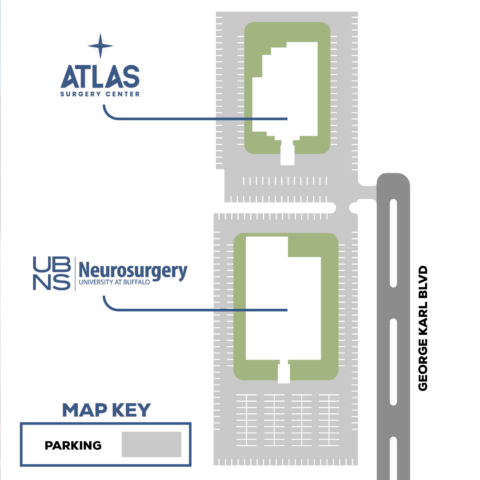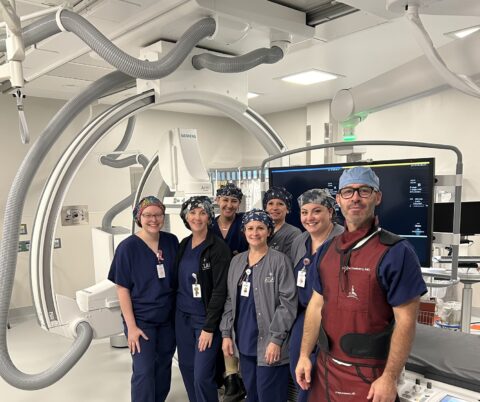Dr. Dana Dunleavy’s Interventional Radiology Services
Jump To:
TO
UBNS is proud to offer interventional radiology services in collaboration with Dana Dunleavy, MD, the medical director of Atlas Interventional Radiology at the Atlas Surgery Center. Interventional radiology can be used for a variety of treatments, from men’s and women’s health to orthopedic and oncology.
Patients can be referred to UBNS interventional radiology by their physicians or can self-refer.
What is Interventional Radiology?
Interventional radiology is a practice that involves doctors using medical imaging technology to diagnose and treat various illnesses, diseases, and conditions. It typically provides a less invasive alternative to traditional surgical procedures and treatments.
UBNS, in collaboration with Dr. Dunleavy, offers interventional radiology procedures at the Atlas Surgery Center. We offer diagnostic exams and post-procedure follow-up appointments at our nearby Comprehensive Neuroscience Center.
Benefits of Interventional Radiology
Minimally Invasive
Interventional radiology is a minimally invasive, non-pharmaceutical alternative to open surgery. Procedures typically involve small, image-guided minimally invasive incisions to ensure small instruments such as catheters and wires are directed to the affected area.
All Outpatient
All UBNS interventional radiology procedures are outpatient, so you get to go home the same day without a hospital stay. They also don’t require general anesthesia. Most procedures involve a local anesthetic or conscious sedation – so you’re awake but not feeling any pain or discomfort during the procedure.
Fewer Risks & Shorter Recovery
Because doctors aren’t using general anesthesia or making incisions, interventional radiology procedures involve much lower risks for complications, side effects, and morbidity. Recovery time after an interventional radiology procedure is also much shorter than recovery from a traditional surgery.
Why Choose Interventional Radiology Through UBNS?

State-of-the-Art Equipment
UBNS works in collaboration with the Atlas Surgery Center, a state-of-the-art facility located right next to our Comprehensive Neuroscience Center in the Buffalo area. Atlas is a new ambulatory surgery center supplied with the best equipment in the region and some of the most advanced imaging systems available.
The surgery center includes a biplane room equipped with external imaging systems that provide multiple views simultaneously, a specialized vascular room, and one of the most innovative interventional radiology rooms in the country.
Expert Support From Beginning to End
UBNS is proud to offer robust clinical care before and after your interventional radiology procedure. All interventional radiology patients will see Dr. Dunleavy for a physical exam, where he will make a diagnosis and develop a treatment plan.
While treatment plans are customized to the patient and each procedure is different, we also provide follow-up care as needed in the weeks after a procedure to ensure optimal outcomes.
Easily Accessible Facilities
Most UBNS interventional radiology patients will visit two facilities – our Comprehensive Neuroscience Center and the Atlas Surgery Center. These buildings are conveniently located next to each other and are outside Buffalo city limits, so you won’t have to deal with as much traffic or congestion.
Both buildings offer easy parking, with plenty of spaces, and a very short walk to the building itself.


Interventional Radiology Procedures We Offer
Our interventional radiologist frequently collaborates and receives referrals from specialists in gynecology, neurosurgery, orthopedics, oncology, and other areas of medicine. Some of the most common interventional radiology procedures we offer include:
Neuro Interventional Radiology
- Kyphoplasty: Offers pain relief for fractures in the vertebrae
- Bone Tumor Ablation: Treats small bone tumors and relieves pain
- Spinal Cord Stimulator: Relieves pain in the spinal cord
- Pain Pump: Implants a small device that delivers pain medication to your spinal cord
- Bone Biopsy: Collects bone samples to test for cancerous or abnormal cells
- SI Joint Injection: Treats lower back pain by delivering medicine to the sacroiliac joint
- SI Joint Fusion: Stabilizes the sacroiliac joint using implants
Vascular Interventional Radiology for Men’s & Women’s Health
- Fibroid Embolization: Shrinks uterine fibroids by blocking their blood supply
- Ovarian Vein Embolization: Treats pelvic congestion and relieves pain by closing off abnormal veins
- Iliac Vein Stenting: Improves blood flow by placing a stent in a compressed iliac vein
- Leg Vein Closure/Varicose Vein Treatment: Shrinks and closes painful, unhealthy varicose veins in the legs associated with superficial venous insufficiency
- Gonadal Vein Embolization: Blocks problem veins in the pelvis to redirect blood flow and relieve pain
Orthopedic Interventional Radiology
- Knee Ablation: Relieves knee pain using radiofrequency energy
- Knee, Shoulder, and Hip Embolization: Reduces inflammation to relieve pain in the knee, shoulder, or hip
Oncology Interventional Radiology
- Tumor Ablation: Treats tumors by destroying cancerous cells
- Tumor Embolization: Treats tumors by cutting off their blood supply
- Biopsy: Collects tissue or cell samples to test for cancerous or abnormal cells
- Mediport Placement: Implants a mediport catheter under your skin that can deliver chemotherapy, medication, and fluid via IV
What to Expect from Interventional Radiology at UBNS
 At UBNS, we accept all patients for interventional radiology – whether you’re referred to us by another specialist or are making an appointment yourself to explore your treatment options.
At UBNS, we accept all patients for interventional radiology – whether you’re referred to us by another specialist or are making an appointment yourself to explore your treatment options.
All patients will meet with Dr. Dunleavy first at our interventional radiology clinic at the UBNS Comprehensive Neuroscience Center. During a clinical appointment, Dr. Dunleavy may provide a physical evaluation to confirm a diagnosis, order diagnostic imaging, or discuss treatment options.
Your interventional radiology procedure will take place at the Atlas Surgery Center. All procedures we offer are outpatient, so you’ll go home the same day to recover.
Dr. Dunleavy will schedule a follow-up appointment with you at the clinic a few weeks after your procedure if needed.
Meet Your Interventional Radiologist
Dana Dunleavy, MD
 Dana Dunleavy, MD, is an interventional radiologist who has performed hundreds of minimally invasive procedures to treat neurological, orthopedic, oncological, and gynecological conditions. In addition to his role as medical director of Atlas Interventional Radiology, he also currently serves as the medical director of the Interventional Radiology program at Olean General Hospital.
Dana Dunleavy, MD, is an interventional radiologist who has performed hundreds of minimally invasive procedures to treat neurological, orthopedic, oncological, and gynecological conditions. In addition to his role as medical director of Atlas Interventional Radiology, he also currently serves as the medical director of the Interventional Radiology program at Olean General Hospital.
After graduating from the University of Vermont College of Medicine with his medical degree, Dr. Dunleavy completed his radiology residency and fellowship training at Johns Hopkins, one of the top hospitals in the United States.
In 2005, Dr. Dunleavy was inducted into the Alpha Omega Alpha Honor Medical Society – an honor that only goes to the top 1-2% of physicians. He holds positions on several councils for the Society of Interventional Radiology, including the position of Vice Chair for the Pain Management Council.
Dr. Dunleavy has consistently been recognized as a top doctor in Buffalo and is widely recognized as a leader in the interventional radiology field. He is the most experienced kyphoplasty doctor on the East Coast and teaches other physicians all across the country how to perform these minimally invasive procedures.
How to Schedule an Interventional Radiology Appointment With Dr. Dunleavy
Dr. Dunleavy is scheduling appointments at our 40 George Karl Boulevard office, off of Wehrle Drive in Williamsville.
Specialist Referral
Specialists looking to refer patients to Dr. Dunleavy can call 716.218.1000.
Self Referral
Patients looking to book an appointment without a specialist referral can call 716.218.1000 and ask to speak with Team Dunleavy. You will be transferred directly to his team’s extension, where you can schedule an appointment.
Follow along with us
Publications | July 3, 2025
View all PublicationsValidation of the HERMES-24 Score for Outcome Prediction Post Large Vessel Occlusion Treatment in Later Time Window
In the News | January 20, 2025
UBNS in the NewsDr. Elad Levy, UB Neurosurgeon, Named One of WNY’s Top Doctors in 2025
Buffalo Spree has named Dr. Elad Levy of UB Neurosurgery to its 2025 list of Top Doctors in Western NY. In this feature, Dr. Levy shares insights on advancements in neurosurgery and stroke care for…
Continue to news article
